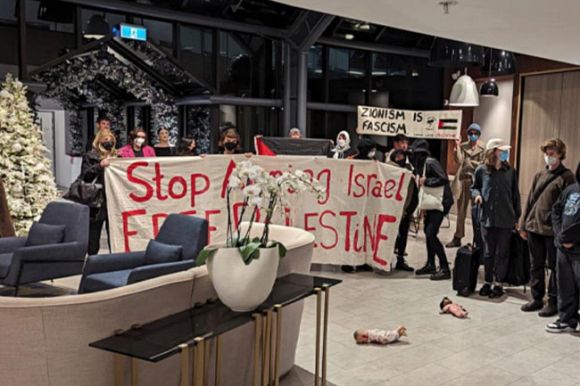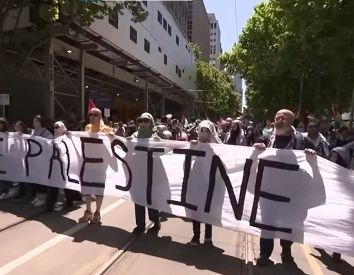Rallies in support of Palestine are a reminder of the anti-Iraq War protests of 2003, only now the people are raising their voices from a different perspective. Davey Heller reports.
IT IS LIKELY unclear to many of the hundreds of thousands marching week after week in Australia, against Israel’s murderous rampage and genocide in Gaza, that they are part of an unprecedented movement.
The only remotely comparable protests occurred in February 2003, when Australians joined the up to 15 million people globally marching against the imminent U.S.-led imperialist invasion of Iraq. A comparison of the two protest movements shows, however, that we are currently witnessing a far more anti-imperialist and working class-orientated protest movement than in 2003.
Whilst there was genuine anti-imperialist sentiment amongst the protestors in 2003, the leadership included much of the liberal or “progressive” civil society including unions, churches, and NGOs. The war was being prosecuted by a Republican president which gave space for these liberal forces to move in opportunistically.
In Australia, there was a Right-wing Howard-led Government. Simon Crean, the then Australian Labor Party opposition leader, even spoke at the rally in Brisbane, although he was booed by the crowd when declaring he would support an attack on Iraq if it had UN approval. This liberal framework of the war being “illegal” as it had not been sanctioned by the “thieves’ kitchen” of the UN Security Council was typical of much liberal “anti-war” discourse of the time.
This liberal orientation contributed to the fact the protests simply evaporated after the war started in 2003. They were built on pacifist and liberal illusions and had no perspective to continue fighting once the “shock and awe” campaign started. They were built on a healthy hatred of the horrors of war in the masses but lacked political depth.
The Palestinian solidarity protests in comparison are not being led by any such mainstream liberal/progressive forces. They are also being launched in opposition to a war being endorsed by a Democrat president and supported in Australia by State and Federal Labor governments.
Most of formal civil society is too cowed or compromised to formally endorse and promote the mass protests the ruling class has slandered as “divisive” or even anti-Semitic. The churches and the NGOs who only a few months ago marched and hung banners promoting the Federal Labor Government's Voice Referendum for an Indigenous consultative body are conspicuously silent on Palestine.
Whilst rank-and-file unionists are vigorously organising in opposition to the war through the Trade Unionists for Palestine network in contrast the trade union bureaucrats in Australia are silent or only offering token support. They do not want to expose their political patrons in the Labor Government.
I have attended all the marches so far in Melbourne and observed that the leadership of the protests is much more grassroots and rank-and-file. Significantly, the Australian Palestinian community and the long-time solidarity networks are playing a massive role in organising the street protests. There was not anything equivalent in 2003, such as a diaspora Iraqi community in the West.
Arab Australians and the Muslim community more generally are also playing a leadership role. The 2003 Iraq War occurred in the immediate aftermath of the declaration of the bogus “War on Terror” and it was a very difficult time for West Asian-descended populations in the imperialist centres to organise politically in a visible way.
The leadership of the Palestinian community and their long-time solidarity networks have given these protests a much more Left-wing and anti-imperialist underpinning based on their decades-long struggle and perspective.
One of the very notable elements in the imperialist centres of the U.S., Canada and Australia is the linking of the struggle for Palestinian rights with the framework not just of anti-imperialism but settler colonialism. This has allowed links to be made with the struggles of Indigenous peoples and First Nations of these countries who are also victims of ongoing dispossession and genocidal violence. This has manifested with activists from the “Black Sovereignty” movement such as Senator Lydia Thorpe speaking at all Melbourne rallies as well as groups such as the Black Peoples Union co-organising and leading several direct actions.
The leadership and political sophistication of the Palestinian diaspora and the connections being made between the Palestinian struggle and other struggles against settler colonial violence have exploded on social media with a tsunami of pro-Palestine content. TikTok has been turned into a virtual “people's university” giving a whole new generation a crash course in the history of Zionist and imperialist oppression of Palestine.
TikTok, under pressure, was forced to issue a press release protesting that it was not their algorithm’s fault their platform was full of pro-Palestine content — it's just that young people by and large support Palestine.
The online outpouring of support for Palestine is linked also to the Black Lives Matter protests of 2020. Many of the content creators are U.S. Left-wing people of colour radicalised at that time who are now directly linking their own struggles against the police and U.S. ruling class with the struggle against the Zionist genocide of Palestine. This framework of fighting racialised state oppression has also influenced many young people in Australia of all backgrounds.
The current protests are therefore grounded for many in anti-imperialist, anti-colonial and often anti-capitalist perspectives. This means many of the ordinary working-class people involved in the protest are much more realistic than in 2003 about the kind of struggle they are waging. They are aware that the protests will not be enough to end the genocide and free Palestine. They are aware the struggle will need to be broadened and deepened. They are aware that workers will need to use their collective power. They are aware that the struggle is being waged in opposition to all factions of the ruling classes of their countries.
This helps explain why the protests are growing each week rather than dissipating. It means that even when the protests inevitably drop away in the short term, they are laying the groundwork for an ongoing anti-imperialist war struggle in a way that the 2003 protests just failed to do.
Davey Heller is a writer and campaigner. You can follow him on Twitter @socialist_davey.
Related Articles
- Israeli military attacks are an affront to human rights
- Palestinian hopes paralysed under new Israeli government
- Gaza between a new cycle of destruction and promises of reconstruction
- Freedom of speech helping to fade the Israeli narrative
- Stop pretending Jewish anti-Zionists don’t exist
 This work is licensed under a Creative Commons Attribution-NonCommercial-NoDerivs 3.0 Australia License
This work is licensed under a Creative Commons Attribution-NonCommercial-NoDerivs 3.0 Australia License
Support independent journalism Subscribe to IA.














